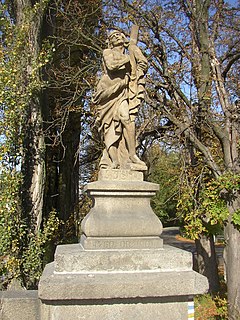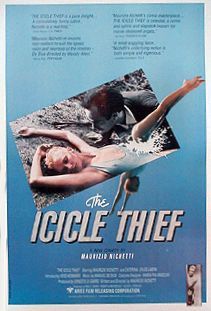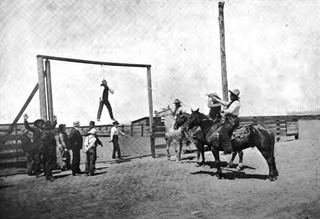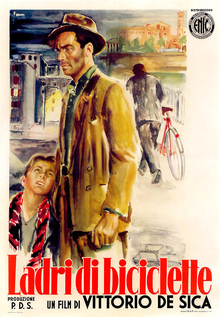A thief is a person who commits theft.

Vittorio De Sica was an Italian director and actor, a leading figure in the neorealist movement.

Cesare Zavattini was an Italian screenwriter and one of the first theorists and proponents of the Neorealist movement in Italian cinema.

The Penitent Thief, also known as the Good Thief or the Thief on the Cross, is one of two unnamed persons mentioned in a version of the Crucifixion of Jesus in the New Testament. The Gospel of Luke describes one asking Jesus to "remember him" when Jesus will have "come into" his kingdom. The other, as the impenitent thief, challenges Jesus to save himself to prove that he is the Messiah.
A gentleman thief, gentleman burglar, lady thief, or phantom thief is a stock character in fiction. A gentleman or lady thief usually has inherited wealth and is characterised by impeccable manners, charm, courteousness, and the avoidance of physical force or intimidation to steal. As such, they steal not only to gain material wealth but also for the thrill of the act itself, which is often combined in fiction with correcting a moral wrong, selecting wealthy targets, or stealing only particular rare or challenging objects.

The Icicle Thief is a 1989 Italian comedy film directed by Maurizio Nichetti, titled in imitation of Vittorio De Sica's classic Italian neorealist film The Bicycle Thief. Some feel The Icicle Thief was created as a spoof of neorealism, which predominated Italian cinema after World War II. However, it is generally understood to go beyond this and to take a stand against commercialism as destructive towards art. The film won the Golden St. George at the 16th Moscow International Film Festival.

Ali Baba and the Forty Thieves is a folk tale included in many versions of One Thousand and One Nights. Antoine Galland, who heard the story from Syrian storyteller Hanna Diyab, added it to the Nights in the 18th century. It is one of the most familiar of the "Arabian Nights" tales, and has been widely retold and performed in many media, especially for children, where the more violent aspects of the story are often suppressed.
A thief in law in the Soviet Union, the post-Soviet states, Serbia and respective diasporas abroad is a specifically granted formal status of a professional criminal who enjoys an elite position within the organized crime environment and employs informal authority over its lower-status members. The phrase "Thief in Law" is a rudimentary, word-by-word translation of the Russian slang phrase "вор в зако́не", literally translated as "a thief in [a position of] the law", that can have two meanings in Russian: "a legalized thief" and "a thief who is the law". Each new Vor (thief) is vetted by consensus of several Vors. Vor culture is inseparable from prison organized crime: only repeatedly jailed convicts are eligible for Vor status. Thieves in law are drawn from many nationalities from a number of post-Soviet states.

A fence, also known as a receiver, mover, or moving man, is an individual who knowingly buys stolen goods in order to later resell them for profit. The fence acts as a middleman between thieves and the eventual buyers of stolen goods who may not be aware that the goods are stolen. As a verb, the word describes the behaviour of the thief in the transaction: The burglar fenced the stolen radio. This sense of the term came from thieves' slang, first attested c. 1700, from the notion of such transactions providing a defence against being caught. The term remains in common use in all major dialects of modern English, all of which spell it with a "c" even though the source word in some dialects is now spelled defense.
The rogue or thief is one of the standard playable character classes in most editions of the Dungeons & Dragons fantasy role-playing game. A rogue is a versatile character, capable of sneaky combat and nimble tricks. The rogue is stealthy and dexterous, and in early editions was the only official base class from the Player's Handbook capable of finding and disarming traps and picking locks. The rogue also has the ability to "sneak attack" enemies who are caught off-guard or taken by surprise, inflicting extra damage.

Lamberto Maggiorani was an Italian actor remembered for his portrayal of Antonio Ricci in the 1948 Vittorio De Sica film Bicycle Thieves.
Robert O'Neil "Bob" Forrest is the lead vocalist and lyricist for Los Angeles bands Thelonious Monster and The Bicycle Thief. In September 2006 he released his first solo album, Modern Folk and Blues Wednesday. He is also a drug counselor, appearing alongside Dr. Drew Pinsky on Celebrity Rehab and Sober House.

Ali Baba Bujang Lapok is a 1961 Singaporean comedy film directed by, written by and starring Malaysian silver-screen legend P. Ramlee and produced in Singapore by Malay Film Productions Ltd. Based loosely on the story of Ali Baba from 1001 Arabian Nights, the film is occasionally self-referential and contains elements of anarchic comedy, burlesque comedy, satire and farce. The title includes the suffix Bujang Lapok because it is the third instalment in the Bujang Lapok series of comedy films that star the trio of P. Ramlee, S. Shamsuddin and Aziz Sattar. This film marked the feature film debut of Sarimah, who would go on to a long movie career, and is also notable as one of the few P. Ramlee films where he plays the villain.

Sly Cooper is a series of platform stealth video games for the PlayStation 2, PlayStation 3 and PlayStation Vita. The series was developed by Sucker Punch Productions for the first three games, and then it was passed on to Sanzaru Games while Sucker Punch continued work on the Infamous series. The first three games were remastered into high-definition for the PlayStation 3 by Sanzaru Games, titled The Sly Collection.

Horse theft is the crime of stealing horses. A person engaged in stealing horses is known as a horse thief. Horse theft was very common throughout the world prior to widespread car ownership. Punishments were often severe for horse theft, with several cultures pronouncing the sentence of death upon actual or presumed thieves. Several societies were formed in the US to prevent horse theft and apprehend horse thieves. However, horse theft continues to occur throughout the world, as horses are stolen for their meat, for ransom, or in disputes between their owners and other persons. Horse theft today is comparable to Automobile theft; a crime punishable by felony jail time. Both horse and car are valuable commodities.

Ali Baba and the Forty Thieves is a 1944 adventure film starring Maria Montez and Jon Hall, and directed by Arthur Lubin. The film is derived from The Book of One Thousand and One Nights but its story departs greatly from the tale of the same name and includes an actual historic event. The film is one of series of "exotic" tales released by Universal during the war years; others include Cobra Woman, Arabian Nights and White Savage.

Cheyenne Rides Again is a 1937 western film directed by Robert F. Hill. It stars Tom Tyler and Lon Chaney Jr.. Much as did Alfred Hitchcock in his own films, director Hill appears in a cameo as townsman "Bartender Ed".

Bicycle theft is the crime of stealing a bicycle.














